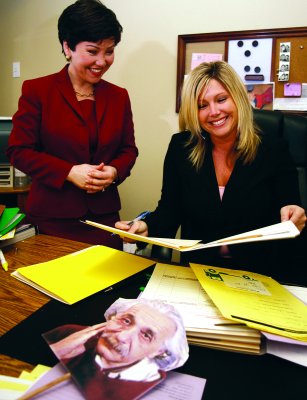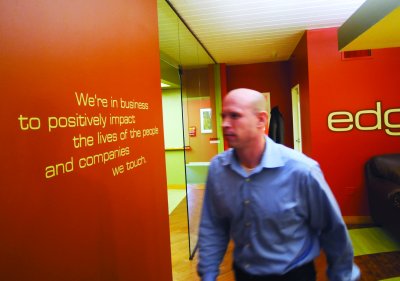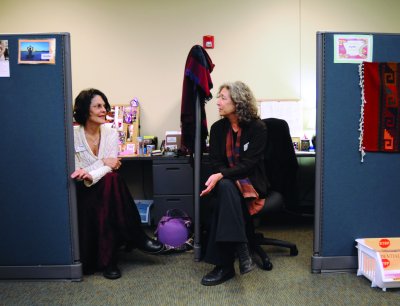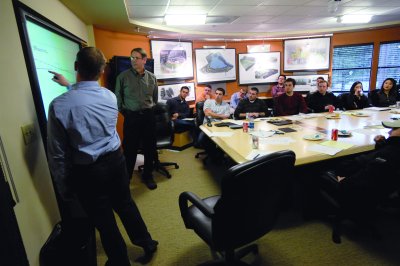What does it take become one of the 100 Best Companies to Work For in Oregon? From benefits and education, to a caring environment and ethical management, here are the lessons from some of The Best.
THE 100 BEST COMPANIES
What does it take become one of the 100 Best Companies to Work For in Oregon? From benefits and education, to a caring environment and ethical management, here are the lessons from some of The Best. — THE EDITORS
|
BEYOND THE BENNIES
By Abraham Hyatt
The benefits offered by the companies at the top of the 100 Best list are, unsurprisingly, really, really nice.
Some companies pay 100% of medical, dental and vision premiums. They contribute money to employees’ health savings accounts and flexible spending accounts. They have education funds for employees. There’s onsite daycare, paid gym memberships and the ability to cash out unused vacation hours.
At others, there’s no vesting waiting period for matching 401K plans. There’s profit sharing. Massages. Clothing allowances. Dry cleaning pickup and drop-off at the office. Adoption and in-vitro fertilization reimbursement. Endless parties, gifts, birthday presents and barbeques. Bottomless free coffee. Oh, and paid time off for jury duty, too.
The most important part of a benefits package, however, may have nothing to do with what the actual goodies are. If you ask 100 Best Companies to give advice to businesses who don’t have the greatest benefits, their answer may be surprising: It’s not necessarily what you give your employees, but that you let them have a say in which benefits the company offers.
At its core, a good benefits package does several things. First, it shows employees that they’re cared about. “It has to cover people’s needs, like medical,” says Lisa Rivet, HR manager at PricewaterhouseCoopers (No. 5 Large Company) in Portland. “It also has to cover life as it happens. It’s about making people feel valued.”
Creating that feeling sometimes goes beyond offering sick time, says Rhonda Waterhouse-Rosier, president and owner of Beaverton’s Staff Finders Technical of Oregon (No. 1 Small Company). For her, that means paying, no matter what, 100% of employees’ health insurance premiums.
But showing employees that you care also goes beyond the benefit you offer them, say companies on the 100 Best list. And while it may sound illogical, that can actually be easier the more employees you have.
Annie Hoy is the outreach manager at the Ashland Food Co-op (No. 25 Small Company). Its package was developed and continues to change based on input from employees. As the company has grown over the last 30 years, Hoy says the process has gotten easier.
“It’s challenging to get input from everyone, but it works. And when you do make a change, everyone has had their say. It makes it easier for people to accept change when it’s not handed down from the top,” she says.
Waterhouse-Rosier agrees. Do a survey and find out what’s important to workers, she says. That doesn’t necessarily mean giving employees whatever they want. According to Christa Summers, director of human resources at Edge Wireless (No. 2 Large Company) in Bend, generational differences between workers can create different priorities. “If there’s a 20-year-old who doesn’t think health insurance is important, we think it is, and so that’s what we offer,” she says.
But no matter what the final benefits package looks like, Summers says it’s crucial to keep communicating with employees.
“The most critical thing is to follow up so that they understand why you did and didn’t include something. They have to feel like they’re a part of the process,” she says. “You’re way ahead of the game if you do that.”
|
THE CARE PACKAGE
By Ben Jacklet
Nina Martin never would have kept her job, much less made partner, if her company didn’t care about her as a person.
Martin is a mother of three and an accountant at Pittman & Brooks, PC, and she has benefited hugely from her company’s commitment to building and operating an onsite daycare. The Portland firm (No. 6 Small Company) draws ample praise for perks such as an all-expenses paid annual retreat and a well-stocked “feeding trough” to power everyone through the tax season. But for Martin nothing compares to the Darling Deductions Pre-School, which has allowed her to walk downstairs and comfort her children as needed, without missing a step professionally. “I would have stopped working a long time ago if it weren’t for the daycare,” she says.
The extras that add up to a shared sense that a company cares about its employees don’t just keep good staffers around. They also keep them happy, healthy and ready to reciprocate with extra hours when it comes to crunch time. Martin says she has no problem putting in the 80-plus hours per week required as April 15 approaches, because she knows she’s getting the support she needs.
An onsite daycare was a substantial investment for Pittman & Brooks, but co-owner Randa Pittman-Brooks says it was worth it to attract the best employees available. Besides, she adds, “Work’s not the most important thing in the world.”
Tina Bauer, a branch manager for Oregon Community Credit Union, has a similar view. Her employer allows her to spend every other Tuesday afternoon volunteering at her daughter’s school as part of an extensive volunteer effort that saw employees donate more than 2,200 hours of their paid work time in 2007 to nonprofits and schools.
|
That volunteer program was widely praised by employees of the Eugene-based credit union (No. 19 Large Company) as one of several efforts to make their work fun and meaningful. One employee wrote: “This company genuinely cares about its staff and community. My worst day here is 1,000 times better than my best day at previous jobs.”
Oddly enough, such comments rarely mention money. But that’s not to say that money doesn’t matter. One less glamorous but equally appreciated way a company can show its employees it cares is to allow them to make the same amount of money in less time. That’s what has happened at Jordan Schrader Ramis, a Lake Oswego law firm (No. 8 Small Company). Numerous employees there applauded management’s ability to promote a healthy balance between life and work that is elusive in the world of law.
Bev Root, chief operating officer, says the firm has worked hard to create a non-hierarchical environment where paralegals are empowered to act as case managers rather than underlings, freeing up attorneys to interact with clients and go out to bring in work.
“We turn things around quickly because we’ve got the right people doing the right jobs,” says Root. “The firm generates more money per employee, so our people don’t have to work endless hours to make the same amount of money.”
Another way to balance work with life is to make the workplace a home away from home. That’s the philosophy at McKinstry Co. LLC (No. 6 Large Company), a Seattle-based mechanical contractor with a growing Portland office, that earned high grades for its barbecues, movie nights and chili cook-offs.
At the January barbecue, the family-style cohesiveness of the Airport Way McKinstry office was fully evident, as employees swapped stories of fishing trips taken with work buddies and how much the kids enjoyed the holiday party.
David Allen, executive vice president, says these perks are hardly incidental. McKinstry launched a “preferred place to work” campaign in 1996, and he says the results have been measurable. “We do more value at a higher percentage net than ever before,” Allen says. “Becoming employee-centric has improved our bottom line.”
|
FROM THE TOP DOWN
By Ben Jacklet
On a sharp winter day, when the sun pours in through the big windows and illuminates a 12th-story view of Portland’s waterfront and Mount Hood, it’s easy to see why the employees of Grady Britton advertising agency enjoy coming to work. They get to listen to the music they like — it’s their job to be creative, after all — and their offices are spacious and cozy, with big posters on the walls showing off their boldest, funniest work. And then there’s their boss, Frank Grady, the firm’s founder, owner and, most recently, king.
Grady’s 22-person staff gave him the royal promotion last year in recognition of his benevolence, his modesty and his love of spoof. He’s even listed as “king” on his business card. Asked how he likes his new position, he grins and quotes Mel Brooks: “It’s good to be the king.”
But real leadership at the workplace is no joke. It can be as big as the difference between retention and high turnover, or between an inspired workforce and a resentful one.
The employees of Grady Britton (No. 5 Small Company) praised their boss up and down in their written comments, mentioning him by name as a source of inspiration. One employee, asked what makes Grady Britton a great place to work, wrote, “two words: Frank Grady. Our President/CEO is among the kindest, most ethical, generous human beings I’ve ever met! I’ll work here as long as he does.”
If that sort of praise strikes you as too hyperbolic to be true, try asking employees of Medford-based United Risk Solutions, what they think of their boss, Jackie Anderberg.
“Jackie has to be the best person to work for in the whole nation if not in the whole world,” says Linda Shaddon, a senior account manager who has known and worked with Jackie for 16 years. “You can’t help but bask in the reflected light.”
The love apparently flows in both directions at United Risk Solutions (No. 2 Small Company). Anderberg has just as many great things to say about her employees as they do about her.
“We hire the best and the brightest and then we get out of their way so that they can do their jobs.” says Anderberg. We make sure that people know that if they have a great idea they can always come and talk to me about it.”
When her company lands a big account, Anderberg gathers everyone in the office to play the “money game.” She stuffs envelopes randomly with 10s, 20s, 50s and 100s, and everyone gets to choose an envelope and open it. She also presents frequent “genius awards” with personal notes from Albert Einstein himself to employees who come up with ideas to make the company more efficient. The perks she offers range from free fruit and chocolate to 37.5 paid hours of bereavement time for the death of a relative.
Of course, the ideal of the friendly boss with the open-door-policy presents a larger challenge when employees number in the hundreds rather than the dozens. When Don Wilson of Canby-based Wilson Construction Co. inherited a business specializing in power-line construction and maintenance from his father, Matt, in the 1980s, it was a small operation run from home. Today he oversees 300 employees and a fleet of four helicopters. But workers at Wilson (No. 17 Large Company) say their boss is as personable as ever. They credit him with fostering an atmosphere that emphasizes friendly competition, whether it means foosball tournaments in the warehouse or a collaborative contest to improve and redesign the technical tools of their trade.
“Our sales are in excess of $100 million a year, but we still hold onto that small company feeling, and a lot of that has to do with Don,” says Debbie Greene, who has worked with Wilson for 25 years. “People know they can go into his office and talk to him in confidence, and he’ll listen.”
Furthermore, adds Tony Helbling, Wilson’s logistics manager, the boss understands that mistakes are a part of innovation: “I’ve worked with other companies where if you screw up you’re out of there. Not here. It’s not what you do wrong; it’s what you do next.”
|
THE RIGHT STUFF
By Jamie Hartford
At Portland-based technology staffing firm EdgeLink, they ring a bell when one of their candidates gets hired. It’s not the dainty tinkling of a Christmas bell, either; more like the hearty clanging of a dinner bell, followed by hoots, hollers and high-fives.
For employees at EdgeLink (No. 3 Small Company), these are the sounds of a job well done, a mission accomplished. But all hoopla aside, they know some of the clients they have best served are those for whom the bell doesn’t toll.
“Sure, we want to close deals and place people as much as possible,” explains business development manager Mark Schacter. “But we always have to consider, is it the right match?”
Though part of their pay is based on how many positions they fill, EdgeLink employees know it’s not the quantity of hires they achieve that matters. It’s the quality.
“We’re not sugarcoating things just to get a transaction,” Schacter says. “When any of us reach a crossroads, we make the right decision every time. It could be something as simple as advising a hiring authority that a person might not be the right fit for that culture.”
Clients, he says, appreciate their honesty.
“They respect our opinion because of it,” he says. “It becomes a proven thing.”
That respect is only rewarded to companies committed to doing the right thing, even when it doesn’t better the bottom line. While profits are important, a business will ultimately succeed or fail based on its reputation, forged through adherence to a strong code of ethics and values, and EdgeLink and other 100 Best companies understand that. They are willing to look beyond business as usual to better those they serve, no matter what the cost, and it pays off in the end.
|
Take, for example, Bend Metro Park & Recreation District (No. 35 Large Company), where they decided that saving the environment was worth more than saving a few bucks. In the past several years, the district, which maintains and operates more than 2,000 acres of parkland, has started programs to recycle its own yard debris and use organic fertilizers, even though it cuts a little deeper into funding.
“We spend more money per acre doing it the way we do it, but the environmental benefit, to us, is worth it,” says natural resource manager Paul Stell. “It isn’t just about the financial bottom line. It’s about the environment and the community.”
At the Portland office of GVA Kidder Mathews (No. 3 Large Company), a full-service commercial real estate firm, they know they’re selling more than just property when they take on a client. In every transaction, their reputation is on the line.
“The best kind of business is repeat business,” says senior vice president Tony Reser.
And in the commercial real estate game, you get that by being up front in all your dealings, says Steven Klein, also a senior vice president with the company.
“It’s an honesty issue,” he says.
Reser agrees.
“The aspect of always putting the clients’ interests first, which doesn’t always dovetail with our interest, that’s not easy to do when you’re a straight commission salesperson,” he says. “But professionalism, integrity and honesty are more important than making a million dollars a year.”
The key to putting those values to use in the workplace is to focus not on short-term goals, but on the bigger picture, says Dan Farrington, president and owner of Keizer-based Sunrise Medical Consultants (No. 18 Small Company), a provider of independent medical examinations for insurance companies.
“I look at what do you leave behind,” he says. “What are they going to say about you? That’s very important.”
His employees buy into that mentality, too — in part because they know their boss is also looking at the bigger picture. He understands that they have families and lives outside of work and encourages them to focus on their performance not just as employees, but also as people. The result, says Carol Rabenstein, lead transcriptionist and quality assurance coordinator for the company, is employees who do more than punch in and out.
“You want to do a better job,” she says. “When you found a company on those kinds of principles, you’re going to be successful.”
|
NO PLACE LIKE WORK
By Ben Jacklet
When you envision the perfect work environment, a job caring for the terminally ill probably doesn’t come to mind. Spend an afternoon with the employees of Hospice & Palliative Care of Washington County, however, and you may change your mind, or at least open it.
The Hillsboro nonprofit (No. 20 Small Company), rated second among small businesses in the sub-category of work environment, even though it performs some of the most emotionally draining work imaginable, meeting the physical and psychological needs of terminally ill patients and their families. Yet the hospice’s employees beam with pride as they describe their work environment, the culture they’ve built, the sense of teamwork and compassion, and the flexible, non-judgmental leadership of CEO Christine Larch.
“The level of support we get here is just incredible,” says Sophie Bryer, a social worker.
“We’re all part of a team, and we take care of each other,” adds Rhonda Spencer, director of clinical services. “If people want to talk and share their feelings, they can. If they don’t want to talk they don’t have to. But we’re always checking in to make sure everybody’s doing OK.”
When one of the hospice’s nurses needed time off to recuperate from the floods after her hometown of Vernonia was swamped in January, her co-workers pooled their extra vacation time and donated five weeks’ worth.
Workplace surveys leave little doubt that work environment is tied directly to morale, a company’s ability to recruit the best candidates and an employee’s willingness to put forth extra effort. But there is little consensus as to what the phrase work environment even means. For the hospice team, it is a communal phenomenon that has little to do with their physical workspace, a nondescript suite in a suburban strip mall.
|
Elsewhere, a comfortable workspace that serves as a sanctuary from the daily barrage of stress can be crucial. That’s the concept behind the inviting digs of Rose City Mortgage Specialists (No. 4 Small Company).
Everything about Rose City’s suite space in Portland’s John’s Landing exudes peace, from the Buddha statues to the murals quoting Gandhi. Yoga classes are routine. The conference room is more likely to be used for acupuncture or a body-talk session than for a conference.
“This is a high-stress industry so it helps to keep our office as calm and stress-free as possible,” says founder and president Renee Spears. She started the company with the idea of working from home in her sweats with her kids and dogs, but “the referrals just kept coming.” She was determined to make her office as inviting as possible.
That can be a challenge in times of economic downturn. Things had gotten so bad in the mortgage industry by last September that Spears decided to celebrate Christmas in October, surprising her staff by decorating the entire office overnight and having breakfast catered the next morning.
Her motivation is simple: “I’ve got great people working for me. I want to keep them.”
That sentiment is echoed vigorously by the Oregon management team of U.S. Cellular, the Chicago-based company that takes first place again this year in the large business category for the third year in a row — never mind that midway through its winning run the company laid off more than 160 Oregon employees when it closed its Medford call center in 2006.
Calvin Emigh, director of sales, says the company did all it could to soften the blow and keep up morale. “The associates who were impacted by the closing of the call center were not just sent a letter. The CEO and his team came out in person and explained what was happening and why. Every one of those associates was offered a position at another call center. We hired back as many associates as we could and we tried to help with job placement for the others.”
Apparently it worked. Not one U. S. Cellular employee mentioned the layoffs in this year’s questionnaire. More common responses praised the benefits, the team atmosphere, and the emphasis on making the workplace an enjoyable and fulfilling place to be.
In that regard, people who sell cell phones seem to want the same things as people caring for the terminally ill: camaraderie, respect and trust.
|
TARGET OF OPPORTUNITY
By Ben Jacklet
For Todd Anderson, an engineer with the Portland office of Qualcomm, one of the best things about his work is that it isn’t just work. It’s an opportunity to delve deeply into the wide-open intellectual frontier of wireless technology.
“Anybody who thinks they have great ideas and is excited about putting those ideas to work, this is the place where you want to be,” he says.
Anderson believes he has the best of both worlds: ample support from “the mothership,” a San Diego-based Fortune 500 company, combined with the local freedom to pursue his curiosity and “exercise the brain.” His enthusiasm is not unusual at Qualcomm (No. 8 Large Company), which earned big accolades for its office culture of freedom and opportunity.
“Our people are encouraged to do what they want to do and to take it as far as they want to go,” says Qualcomm recruiter Anita Bradel. “You can define what your job will be. The basic idea is, if I give you a written expectation of what your job is, that will only limit you.”
The workplace as a source of opportunity is nothing new, but it is a concept that is growing increasingly important for recruiting and retaining employees from an increasingly mobile workforce. As employees become more entrepreneurial, the notion of opportunity expands. Whether it’s opportunity for advancement, for learning, to do the work you love, or to work with people you respect, it’s a theme that employees bring up time and again.
At the Portland office of Grant Thornton LLP (No. 4 Large Company) employees get the opportunity to work for the fifth-largest accounting firm in the world but with a comparatively low 10-to-one ratio of staff to partners. “People out of college like that ratio because they see that as an opportunity to interact with people at the very highest level of the organization,” says Tony Parke, a Grant Thornton assurance partner.
Grant Thornton employees also like the opportunities in training and career development, which range from local mentoring and national conferences to a global transfer program, which enables employees to volunteer for two to three years overseas and then return to the U.S. with expertise in a specific country’s business environment.
Global opportunities are also opening up for employees of WRG Design (No. 12 Large Company), a fast-growing Portland land development company, which merged with the Australian firm Cardno Limited in 2007. Cardno has an extensive global business and receives grants from relief groups such as Portland’s Mercy Corps to rebuild infrastructure after times of conflict. The merger has already involved WRG staffers in one compelling project in Dubai to develop artificial islands made by pouring sand into the sea.
In the area of continuing education, WRG recently launched “WRG University,” offering dozens of courses to help employees further their careers. The program enables workers to learn more about everything from sustainable site design to hydrology drainage reports, on site and on company time.
“We give our employees freedom, flexibility and opportunity, and those three add up to an entrepreneurial environment,” says WRG’s director of marketing, Allison Dyer. “You aren’t just punching in and doing your 9 to 5. You can be as ambitious as you want to be.”
The same holds true for United Human Capital Solutions (No. 7 Small Company), a Lake Oswego medical staffing firm that provides nurses and physicians for hospitals in need of temporary or permanent help. Vice President Joel Slenning explains that the company is structured to allow employees to build what amounts to a specialized independent business within the company. The employee takes over a specific segment of the industry, for example pediatric care in Central California, and is then free to expand as widely as possible — with no cap on commissions for business brought into the company.
“It’s an opportunity for people to run a business within a business, without taking a big risk or gaining access to large amounts of capital,” says Slenning. “We’ll share the risk with them, we’ll make the investment, and we’ll train them. We provide all that is needed to get their business going. They can continue to grow their piece of the pie. And we will not cap anyone’s earnings.”
TROUBLING TRUTHS
By Abraham Hyatt
“You know all that stuff about recognizing accomplishments, building a good working culture, investing in our employees, etc.? We talk all of that here, but we don’t do it.”
At the very bottom of the 100 Best survey results — several hundred spots below those coveted top rankings — are a lot of unhappy workers. Managers and employers take note: There’s a lot to be learned from these comments because chances are, you’re making at least a few of these mistakes.
In the anonymous comment section of their surveys, employees wrote about the lack of good benefits and the lack of diversity in management. They described how badly they needed help with the high cost of insurance, and how they were tired of being treated unfairly. They sounded angry, sad, and above all, frustrated.
“Where do you start? No communication. No raises. No training. Constantly put in bad situations and left on your own to survive. Always trying to do the job with no support. Management will promise items but never comes through. Worst morale in a company that I have ever worked for.”
Some complaints would be relatively easy for management to address. Like the workers at several different companies who took issue with the office heating system: “Do you notice everyone wearing sweaters, coats and blankets at their desk?”
But to address one of the biggest complaints, bosses and business owners are going to have to do some soul searching. Some of your employees think you’re doing a terrible job.
“Management is secretive, evasive, and are micro-managers,” wrote one employee. “No clear path, just knee-jerk reactions. Owner has virtually no contact with staff. Not enough employees to handle growing business. People are overworked, overstressed, unappreciated, occasionally yelled at by the VP.”
Despite the anger, a majority of employees clearly wanted to like their jobs. There were challenges to management: “Give us something to be proud of in public.” There were pleas for awareness: “This [work overload] eats away at the morale of the staff who want so badly to be able to succeed yet are unable to do that with the lack of appropriate staffing and management understanding.”
As they typed or wrote out their complaints, fears and wishes, the comments became a voice employees didn’t have during their workday, the one chance to really ask for change. It’s a lesson that any manager or owner can take to heart: It takes a lot of leadership to become a 100 Best Company.
“Don’t take this lightly,” one employee wrote. “There are many of us in the company who are often ashamed to have to tell people in the community that we work for you. Your supposed ‘reputation’ as a ‘great’ company is something that only exists in the minds of a handful of ‘comfortable’ senior management.
“Will you choose to do what is right, or just sweep this under the rug and continue to play the same old games?”
INTRODUCTION TO LIST
TOP 50 LARGE COMPANIES TO WORK FOR IN OREGON
TOP 50 SMALL COMPANIES TO WORK FOR IN OREGON
ALPHABETICAL INDEX
100 BEST CATEGORY WINNERS
METHODOLOGY
Have an opinion? E-mail [email protected]


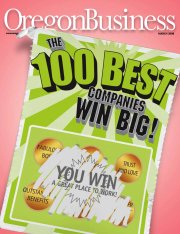


 Branch manager Tina Bauer (left) helps teller Allison McClatchey with a transaction at Oregon Community Credit Union in Eugene, which encourages volunteer work by its employees.
Branch manager Tina Bauer (left) helps teller Allison McClatchey with a transaction at Oregon Community Credit Union in Eugene, which encourages volunteer work by its employees.